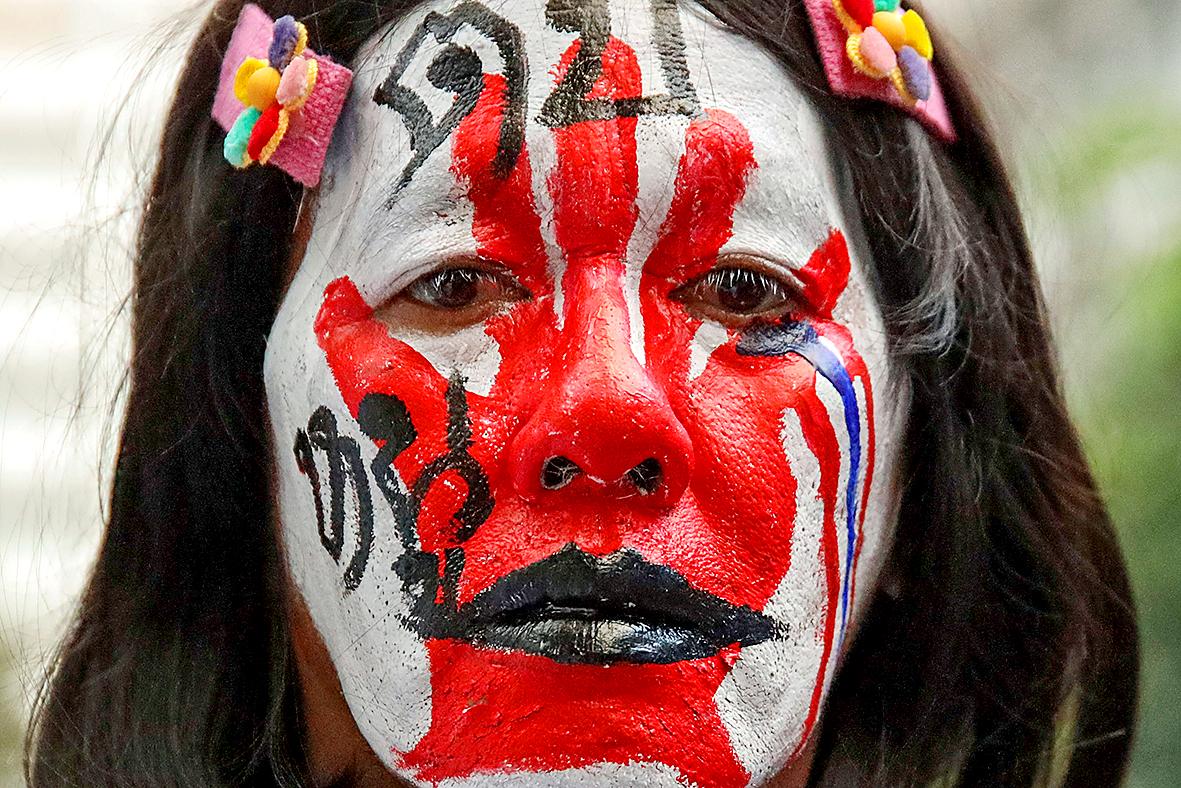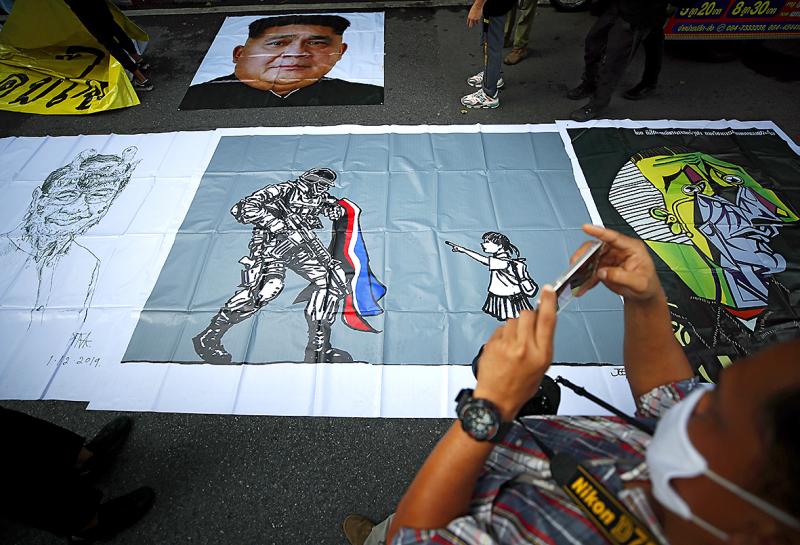From raising hundreds of thousands of dollars for Thai protesters to inspiring the youths who join demonstrations through dances and social media, K-pop fans have emerged as a potent political force in Thailand’s anti-government movement.
Earlier this year, K-pop fans in the US surprised many people by using their social media power to raise funds for Black Lives Matter and to sabotage a re-election rally for President Donald Trump.
But in Thailand they have been part of the youth culture for a long time, and their support for the protest movement reflects the frustrations of a generation that is unhappy with the government using the power of the state to stifle dissent.

Photo: Reuters
“K-pop fans would love to just fangirl over our ‘oppas’ and care about nothing else, but with our country like this, we as citizens have to call for better things,” said Suphinchaya, 23, using the term of endearment for male K-pop artists.
Like many Thai protesters she declined to give her full name because of the sensitivity of the issue.
Young, mostly female, and social media-savvy, the profile of K-pop fans matches that of many protesters, said Chayanit Choedthammatorn, a Thai researcher of Korean studies.

Photo: EPA-EFE
“Although they are K-pop fans, they are Thai citizens first,” she said.
The greatest spur to action was an Oct. 16 crackdown when police used water cannon to disperse protesters who had defied a ban aimed at ending protests against Prime Minister Prayuth Chan-ocha, a former army chief, and to demand curbs on the monarchy’s power.
Far from the scene, Areeya started a Twitter poll from her Girls’ Generation fanbase account with over 17,500 followers to see if they would help fund the cause.
Results were overwhelmingly positive, she said, as K-pop fans were no stranger to lightning fundraising campaigns — previously using them to buy billboard ads in public spaces to celebrate their beloved artists’ birthdays or album releases.
“Many people were angered by the crackdown and police violence against unarmed protesters that day. They turned that anger into donation money,” Areeya, 23, said.
In just nine hours, Thai fans of the girl group, who called themselves SONEs, raised more than 780,000 baht (US$25,000), along with other Thai K-pop fandoms that collectively raised more than 4 million baht (US$128,000) that week.
Areeya and her team coordinated purchases of protective equipment such as helmets and goggles, organizing deliveries to protest sites, and recording everything for transparency.
The largest chunk of the donation went to Thai Lawyers for Human Rights, a non-profit group that provided pro bono legal assistance to more than 90 protesters arrested since mid-October.
Thai fans of K-pop’s biggest names such as BTS, Super Junior, EXO, Blackpink and SHINee also mobilized. The artists’ labels, SM Entertainment, Big Hit Entertainment, and YG Entertainment, did not immediately respond to requests for comment.
“We’re proud to support the cause we believe in, in the name of someone we love,” said Jan, 27, who raised more than 700,000 baht (US$22,500) with Super Junior’s fandom E.L.F. in 22 hours.
Thai Lawyers for Human Rights said donations soared.
“We suddenly have more than 10 million baht (US$321,440) in our bank account,” said director Yaowalak Anuphan. “I’m amazed by the K-pop fans.”
On social media, K-pop fan accounts that used to focus on news about their favorite artists have turned political — promoting protest-related hashtags and undermining pro-monarchy hashtags with sarcastic messages and K-pop slang.
The presence of K-pop fans is visible at protests, as activists wave LED signs and light sticks, as they would at K-pop concerts, and hold gold-framed pictures of music idols that parody portraits of Thai royals.
The fans’ knowledge of South Korea’s history and the part pop culture played in recent protests was also a source for inspiration.
Natchapol Chaloeykul, 24, danced at recent protests to the sounds of Into the New World by Girls’ Generation — the song sung at student rallies that led to the impeachment of former South Korean president Park Geun-hye in 2017.
“K-pop fans read up about South Korea, and when we look back on our country, we wonder why we can’t be where they are,” said Natchapol.
“Like in the song, we want new things for our country too.”

Climate change, political headwinds and diverging market dynamics around the world have pushed coffee prices to fresh records, jacking up the cost of your everyday brew or a barista’s signature macchiato. While the current hot streak may calm down in the coming months, experts and industry insiders expect volatility will remain the watchword, giving little visibility for producers — two-thirds of whom farm parcels of less than one hectare. METEORIC RISE The price of arabica beans listed in New York surged by 90 percent last year, smashing on Dec. 10 a record dating from 1977 — US$3.48 per pound. Robusta prices have

The resignation of Taiwan People’s Party (TPP) co-founder Ko Wen-je (柯文哲) as party chair on Jan. 1 has led to an interesting battle between two leading party figures, Huang Kuo-chang (黃國昌) and Tsai Pi-ru (蔡壁如). For years the party has been a one-man show, but with Ko being held incommunicado while on trial for corruption, the new chair’s leadership could be make or break for the young party. Not only are the two very different in style, their backgrounds are very different. Tsai is a co-founder of the TPP and has been with Ko from the very beginning. Huang has

A few years ago, getting a visa to visit China was a “ball ache,” says Kate Murray. The Australian was going for a four-day trade show, but the visa required a formal invitation from the organizers and what felt like “a thousand forms.” “They wanted so many details about your life and personal life,” she tells the Guardian. “The paperwork was bonkers.” But were she to go back again now, Murray could just jump on the plane. Australians are among citizens of almost 40 countries for which China now waives visas for business, tourism or family visits for up to four weeks. It’s

A dozen excited 10-year-olds are bouncing in their chairs. The small classroom’s walls are lined with racks of wetsuits and water equipment, and decorated with posters of turtles. But the students’ eyes are trained on their teacher, Tseng Ching-ming, describing the currents and sea conditions at nearby Banana Bay, where they’ll soon be going. “Today you have one mission: to take off your equipment and float in the water,” he says. Some of the kids grin, nervously. They don’t know it, but the students from Kenting-Eluan elementary school on Taiwan’s southernmost point, are rare among their peers and predecessors. Despite most of